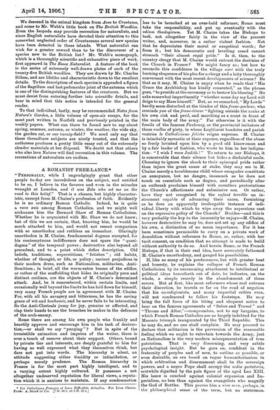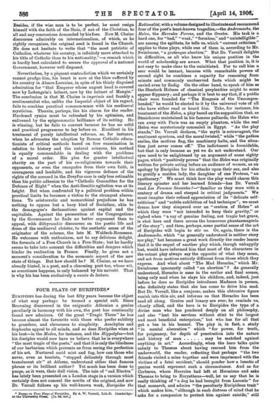A ROMANIST FREE-LANCE.*
"PERSONALLY, while I ungrudgingly grant that other people to-day are incredulous on the subject, and entitled to be so, I believe in the favours and even in the miracles wrought at Lourdes, and it was Zola who set me on the road to this belief" That is a chance, but highly character- istic, excerpt from M. Chaine's profession of faith. Evidently he is no ordinary Roman Catholic. Indeed, he is quite a Tara avis among Roman Catholics, and we might well nickname him the Bernard Shaw of Roman Catholicism. Whether he is acquainted with Mr. Shaw we do not know; but of this we are certain, that, knowing him, he would be much attached to him, and would not resent comparison with so unorthodox and ruthless an iconoclast. Glaringly unorthodox is M. Chaine, fundamental dogmas excepted, for his contemptuous indifference does not spare the " quasi- dogma " of the temporal power; destructive also beyond all precedent, and to a point which defies description. Old beliefs, traditions, superstitions, " fetishes " ; old habits, whether of thought, or life, or policy ; ancient prejudices in their modern dress, such as Nationalism, militarism, Anti- Semitism ; in brief, all the worm-eaten beams of the edifice, or rather of the scaffolding that hides its originally pure and distinct outlines, are the objects of M. Chaine's determined attack. And, be it remembered, within certain limits, and occasionally well beyond the limits he has laid down for himself, very many French people are in agreement with M. Chaine. For, with all his savagery and bitterness, he has the saving grace of wit and bonhomie, and he never fails to be interesting. So the Anti-Clericals jump for joy, genuine or affected, and clap their hands to see the breaches he makes in the defences of the arch-enemy.
Some there are among his own people who frankly and heartily approve and encourage him in his task of destruc- tion,—or shall we say " purging " ? But in spite of the irresistible animation and impetus of the writer, there is ever a touch of reserve about their support. Others, bound by private ties and interests, are deeply grateful to him for having so well expressed what they themselves think, but dare not put into words. The hierarchy is silent, an attitude suggesting either timidity or intimidation, or perhaps merely prudence. The Roman hierarchy in France is for the most part highly , intelligent, and to a varying extent highly cultured. It possesses a not altogether undeserved reputation for liberal views, a reputa- tion which it is anxious to maintain. If any condemnation
• Les Catholigues ,Francais et fears bifficUttes Actuelles. Par Lon Chaine. Paris: A. Stock et Cie. [7 fr. 50 c. et 3 Zr. 50 c.] has to be launched at an over-bold reformer, Rome must take the responsibility,' and put up eventually with the odium theologicum. 'Yet M. Chaine takes the Bishops to task, . not altogether fairly in the view of . the present writer, and, moreover, in a rather violent fashion. Not that he depreciates their moral or exegetical worth ; far from it ; but his democratic and levelling creed cannot stomach "their almost regal pride." Is it, then, to the country clergy that M. Chaine would entrust the destinies of the Church in France ? We might fancy so;' but how to reconcile this confidence in the village cure with the truly burning eloquence of his plea for a clergy and a laity thoroughly conversant with the most recent developments of science ? Be that as it may, M. Chaine is angry when he reads that "His Grace the Archbishop has kindly consented," as the phrase goes, "to preside at the ceremony or to bestow his blessing." He asks somewhat impertinently "whether some day my Lord will deign to say Mass himself." But, as we remarked, "My Lords" hardly seem disturbed at the tirades of this franc-parleur, who reminds you of the franc-tireur "fighting outside the ranks at his own risk and peril, and marching as a scout in front of the main body of the army." Far otherwise is it with the fossils of the famous Faubourg, or the provincial imitators of these ruelles of piety, in whose Legitimist boudoirs and parish vestries le Catholicisme fetiche reigns supreme. M. Chaine is inimitably sarcastic at their expense, regardless of the abuse so freely lavished upon him by a good old kinswoman and by a fair leader of fashion, who wrote to him in her indigna- tion: "I wish I were Judith !" To return to our Bishops, it is conceivable that their silence but bides a disdainful smile. Choosing to ignore the shock to their episcopal pride rather than injure the great cause at stake, they may see in M. Chaine merely a troublesome child whose escapades constitute an annoyance, but no danger, inasmuch as he does not touch on essentials such as dogma, and periodically after an outbreak proclaims himself with countless protestations the Church's affectionate and submissive son. Or rather, have they not recognised in the enfant terrible an in- strument capable of advancing their cause, furnishing as he does an apparently irrefragable instance of indi- vidual liberty with which to wipe away the aspersions cast on the repressive policy of the Church ? Besides—and this is very probably the key to the immunity he enjoys—M. Chaine, however destructive he may be, does not set up any edifice of his own, a distinction of no mean importance. For it has been sometimes permissible to carry on a private work of demolition without reference to Rome, or, rather, with her tacit consent, on condition that no attempt is made to build without authority to do so. And herein Rome, or the French Bishops, if that is their real idea, have accurately fathomed M. Chaine's unorthodoxy, and gauged his possibilities.
If, like so many of his predecessors, but with greater heat and honesty, he explains the collapse of French Roman Catholicism by its unreasoning attachment to intellectual or political ideas henceforth out of date, he indicates, on the whole, a simple remedy in the abandonment of these errors. But at first, like most reformers whose zeal outruns their discretion, he travels so far on the road of negation that his co-religionists, and many impartial critics even, will not condescend to follow his footsteps. He may bring the full force of his biting and eloquent satire to bear on the famous agreements of "Sabre and Trowel" and "Throne and Altar,"—compromises, not to say bargains, to which French Roman Catholics are so largely indebted for the Masonic triumph inaugurated by the Third Republic. This he may do, and no one shall complain. He may proceed to declare that militarism is the perversion of the reasonable feeling which we ought to entertain towards the Army, just as Nationalism is the very modern misrepresentation of true patriotism. That is very discerning, and very subtle psychological insight. But he goes on, confident in the fraternity of peoples and of men, to outline as possible, or even desirable, an era based on vague humanitarianism in which arbitration and disarmament shall be the sovereign powers, and a negro Pope shall occupy the sedia gestatoria, erstwhile dignified by the pale figure of the aged Leo XIII. His lance is couched ' against colonial expansion and Im- perialism, no less than against the evangelists who magnify the God of Battles. This proves him a wise man, perhaps,.in the philosophical sense of the term, but no statesman. Besides, if the wise man is to be perfect, he must resign himself with the faith of the Stoic, if not of the Christian, to all and any concessions demanded by his foes. Now M. Chaine discourses admirably on internationalism, of which, as he rightly recognises, the original seed is found in the Church. He does not hesitate to write that "the most patriotic of Catholics, whatever his country, is infinitely more attached to his title of Catholic than to his nationality,"—a remark which is hardly best calculated to secure the approval of a national Government, however well disposed.
Nevertheless, by a piquant contradiction which we certainly cannot grudge him, his heart is sore at the blow suffered by
his country in Alsace-Lorraine, in spite of his thinly disguised admiration for "that Emperor whose august head is covered now by Lohengrin's helmet, now by the helmet of Mangin." The conclusion is that M. Chaine is imprimis and frankly a sentimentalist who, unlike the Imperial object of his regard, fails to combine practical common-sense with his mediaeval mysticism. Therein, perhaps, lies his charm for the reader. Hardened cynics must be refreshed by his optimism, and enlivened by the epigrammatic brilliance of its setting. He is winning, but he fails to convert because he has no solid and practical programme to lay before us. Excellent in his treatment of purely intellectual reforms, as, for instance, when he advocates the adoption by Roman Catholic educa- tionists of critical methods based on free examination in relation to history and the natural sciences, his method is equally commendable in dealing with the problems of a moral order. His plea for greater intellectual charity on the part of his co-religionists towards their opponents, or even the renegades from their own faith, is courageous and laudable, and his vigorous defence of the rights of the accused in the Dreyfus case is only less estimable than his public adhesion to the "Catholic Committee for the Defence of Right" when the Anti-Semitic agitation was at its height. But when confronted by a political problem within practical limits he becomes a victim to the strangest aberra- tions. To aristocratic and monarchical prejudices he has nothing to oppose but a hazy kind of Socialism, akin to the demagogue's declamations against capital and the capitalists. Against the persecution of the Congregations by the Government he finds no better argument than to appeal, with dithyrambic discourses on the poetic life and dress of the mediaeval cloister, to the aesthetic sense of the originator of the scheme, the late M. Waldeck-Rousseau. He welcomes with enthusiasm, not to say delirious delight, the formula of a Free Church in a Free State ; but he hardly seems to take into account the difficulties and dangers which hinder its realisation in France. Finally, he gives not a moment's consideration to the economic aspect of the new state of things. But how should he ? M. Chaine, as we have already hinted, is a poet, and a charming poet too, whose wit, as sometimes happens, is only balanced by his naïveté. That is why his has been exclusively a succes de lecture.







































 Previous page
Previous page